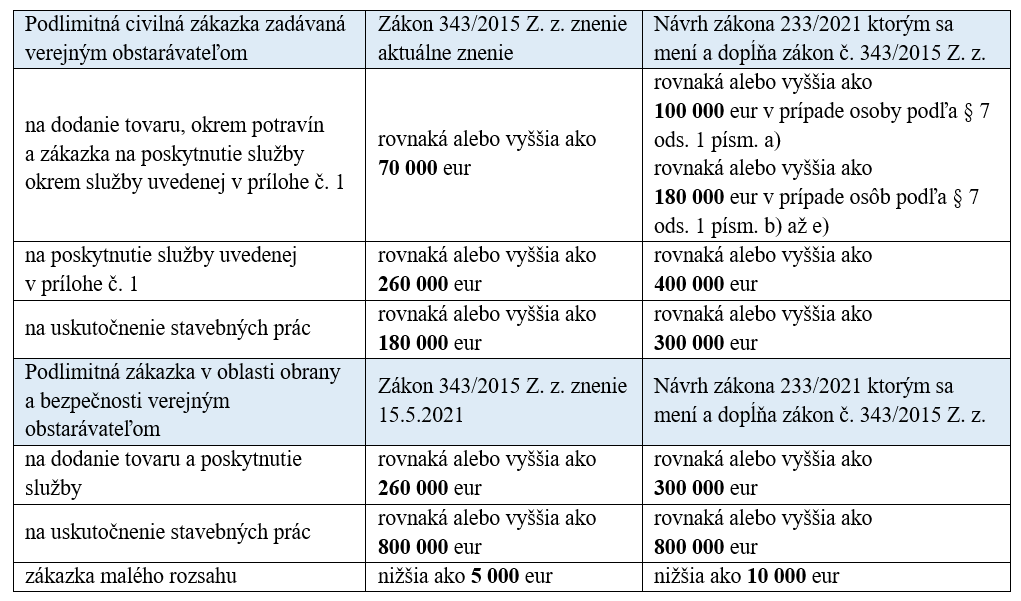According to NGOs, the newly submitted amendment to the Public Procurement Act should bring a compromise evolution and a move forward from the original “revolutionary” change. In this article we will try to summarise the most important changes that the amendment should bring.

At the end of last year, we informed you about the upcoming amendment to Act No. 343/2015 Coll. on Public Procurement by the Deputy Prime Minister of the Slovak Republic, which was supposed to bring “revolutionary”, but also heavily criticized changes to public procurement. Significant public pressure in the form of a petition, as well as other feedback from experts and the Public Procurement Office itself was not in vain and in mid-May a new draft amendment to the Public Procurement Act entered the inter-ministerial comment procedure, the submitter of which is again the Deputy Prime Minister for Legislation and Strategic Planning of the Slovak Republic Štefan Holý, but the Public Procurement Office under the chairmanship of its chairman, JUDr. Miroslav Hlivák, also participated in the preparation of the amendment. In view of the above, we can also state that the proposal of May 2021 is incomparably better and more far-sighted than the previous criticised proposal. This new proposal reflects the proposed changes that the Office has long called for and proposed in its own draft Public Procurement Act, which were first swept off the table. The changes should take effect gradually, with the first changes coming into force as early as 01.01.2022 and some more complex proposals or completely new institutes not coming into force until 2024.
The financial limits known from public procurement have been the subject of many changes and various proposals, and this is no different. With effect from 01.01.2022, the financial limits for above-the-limit contracts should be determined by a regulation of the Government of the Slovak Republic, and not by a generally binding legal regulation issued by the Public Procurement Office. For clarity, we have set out other changes to the limits in the following table:

In this context, we would like to refer again to Transparency International Slovakia, which analysed the impact of the change of the limits in 2018, noting a reduction in the average savings compared to the expected price and a reduction in the transparency of public procurement when increasing the limits.In the past, the Office proposed that the limit that will determine the maximum price of a small-scale contract should be EUR 20,000, today the proposal provides for an amount of EUR 10,000.
Another interesting feature is the modification of the definition of goods, works and services commonly available on the market, which deletes point 1. which states: “are not manufactured, supplied, performed or provided on the basis of specific and unique requirements”, thus extending the group of goods, works and services also to those which are manufactured, supplied, performed or provided on the basis of specific and unique requirements.
The changes in Section 11 of the Act, which speaks about the exclusion of certain entities from the possibility of concluding a contract, concession contract or framework agreement with a public contracting authority, can be positively assessed. The new regulation increases the transparency of public procurement, as para. (c) of the said provision states that the contracting authority and the contracting entity may not conclude a contract, concession contract or framework agreement with a tenderer who is entered in the register of public sector partners and whose final beneficiary is the President, the head of the central government body, a judge of the Constitutional Court of the Slovak Republic, the President and the Deputy President of the Supreme Court of the Slovak Republic, the Prosecutor General, the Special Prosecutor and the Public Prosecutor, the Public Defender of Rights, the President and the Deputy President of the Supreme Audit Office of the Slovak Republic, State Secretary, Secretary General of the Service Office, Head of the District Office, Mayor of the Capital City of the Slovak Republic Bratislava, Mayor of a Regional City or Mayor of a District City, Chairman of a Higher Territorial Unit and a bidder whose subcontractor and sub-subcontractor according to the Act on the Register of Public Sector Partners is registered in the Register of Public Sector Partners and the final beneficiary of the benefits of these subcontractors is one of the aforementioned persons. It is interesting to note in this respect that other entities, such as members of the National Council of the Slovak Republic, mayors of towns and mayors of urban districts are not included in the above provision.
Section 19(3) also allows for the possibility of withdrawing from a contract, concession contract or framework agreement, provided that, after their conclusion, the person referred to in Section 11(1)(c) (the persons referred to above) has become the ultimate beneficiary of the supplier, his subcontractor or his subcontractor under a special regulation.
The Act introduces a new concept of ‘electronic platform’. The statutory definition is rather general and at this point it is only clear that the Office of the Government of the Slovak Republic will be its administrator. The explanatory memorandum states that the aim is to build a single and publicly accessible electronic platform, for the entire public procurement process, for all sub-limit and low-value contracts (if they are to be procured by approaching more than one tenderer). The aim of the presenters is not to create a new electronic system, but to extend the functionality of the already existing electronic marketplace and to unify or link the EVO and the ETC. The functions of the electronic platform should be extended to include a price tracking system. The available information suggests that the issue of the electronic platform as introduced by the amendment is not yet closed. In addition to the above-mentioned electronic platform, the amendment also defines the concept of ‘environmental aspect’, which was mentioned in the law but lacked an actual definition of this concept, which should remedy this deficiency.
The Cabinet Office plans, with reference to the present Bill, to establish a central procurement organisation to provide strategic goods, services and works to contracting authorities under Section 7(1)(a). What can be considered strategic goods, services and works is to be determined by the Government by regulation. The contracting authority will be obliged to procure strategic goods, services and works from or through a central procurement organisation. Procurement through this central organisation is planned for April 2022.
The Public Procurement Act will now also include optional grounds for exclusion of a tenderer and therefore contracting authorities will be able to consider exclusion on these grounds. Section 40 is formally renumbered by adding a new paragraph 8, which will list precisely the optional grounds for exclusion of a tenderer or candidate from a public procurement. This amendment allows contracting authorities to exclude a tenderer or candidate from a public procurement if they have reasonable grounds to suspect that the tenderer or candidate has concluded an agreement with another economic operator in the public procurement procedure which distorts or restricts competition. In this respect, we consider the use of this institute problematic in practice, as we believe that it may be very difficult for the contracting authority to provide evidence of such a reasonable suspicion, but we welcome the fact that the legislator has taken note of this issue and at least addressed it in this way.
Other grounds for optional exclusion would be, for example, that the entity has committed a material breach of contractual obligations in the performance of the contract or concession in the preceding three years from the announcement or demonstrable start of the procurement:
as a result of which the contracting authority or contracting entity has withdrawn from the contract or has suffered serious damage or other serious harm;
or the entity has committed a serious breach of obligations in the field of environmental protection, social law or labour law for which it has been legally sanctioned, which the contracting authority or contracting entity can prove;
or the entity has committed a serious breach of professional obligations, which the contracting authority or contracting entity can prove.
The amendment further extends the possibilities of withdrawal from the contract, framework agreement and concession contract to new hypotheses, e.g. If the competent authority for the protection of competition imposes a sanction on a supplier, a member of a group of suppliers or a concessionaire by a decision which has entered into force after the conclusion of a given contract, framework agreement or concession contract for a breach of the prohibition of an agreement restricting competition which consisted in the coordination of entrepreneurs in any public procurement or in connection with any public procurement, the proposal also takes into account Sections 38d and 38e of Act No. 136/2001 Coll. on the Protection of Competition. The possibility to withdraw from the contract thus complements the legal consequences of proving an infringement in public procurement, which are a fine and a prohibition to participate in public procurement imposed by the Antimonopoly Office of the Slovak Republic. Another hypothesis regulates the possibility of withdrawing from the contract if the contracting authority or contracting entity subsequently discovers, after the conclusion of the contract, that the tenderer has provided false information during the public procurement procedure which had an impact on its participation in the public procurement procedure.
The proposed amendment allows the use of the dynamic purchasing system to conclude a framework agreement for a maximum period of six months, whereas the current legislation in Article 58(3) explicitly excludes the possibility of concluding a framework agreement.The Government Office plans, with reference to the present draft law, to establish a central procurement organisation for the provision of strategic goods, services and works to contracting authorities under Article 7(1)(a). What can be considered strategic goods, services and works is to be determined by the Government by regulation. The contracting authority will be obliged to procure strategic goods, services and works from or through a central procurement organisation. Procurement through this central organisation is planned for April 2022.
The Public Procurement Act will now also include optional grounds for exclusion of a tenderer and therefore contracting authorities will be able to consider exclusion on these grounds. Section 40 is formally renumbered by adding a new paragraph 8, which will list precisely the optional grounds for exclusion of a tenderer or candidate from a public procurement. This amendment allows contracting authorities to exclude a tenderer or candidate from a public procurement if they have reasonable grounds to suspect that the tenderer or candidate has concluded an agreement with another economic operator in the public procurement procedure which distorts or restricts competition. In this respect, we consider the use of this institute problematic in practice, as we believe that it may be very difficult for the contracting authority to provide evidence of such a reasonable suspicion, but we welcome the fact that the legislator is aware of this issue and has at least addressed it in this way.
The law also comes with extensive amendments to ensure greater independence of the Public Procurement Office, in particular by changing the selection, election and appointment of the Chairman of the PPA. The President is elected by the National Council of the Slovak Republic on the proposal of the Government and appointed by the President of the Slovak Republic. The Government proposes to the National Council of the Slovak Republic a candidate or candidates after a public hearing and evaluation by a selection committee. The commission should be composed in such a way that a member of the commission is a person selected by the President of the Slovak Republic, a member is the chairman or deputy chairman of the Supreme Audit Office of the Slovak Republic, the Antimonopoly Office of the Slovak Republic, the Prosecutor General or Deputy Prosecutor General, a representative of public procurers and a representative of contracting authorities, a representative of non-governmental non-profit organisations operating in the field of public finance, public procurement or competition protection, an expert in the field of public procurement and an expert in the field of legal science. Qualification requirements for the chairperson of the PBO are also defined, such as a university degree of at least second level and at least five years of professional experience in public procurement, active knowledge of English, German or French, and the need for a security clearance from the National Security Authority for access to classified information.
The legislator also seeks to speed up the public procurement procedure by modifying Article 170(7) to exclude the lodging of an objection when awarding contracts for the execution of works if the estimated value of the contract is equal to or less than EUR 1 000 000. Also in connection with the forthcoming changes in the field of administrative justice, the possibility to challenge the decisions of the contracting authority and the setting up of the competition for sub-limit and low-value contracts directly by means of an action before the administrative courts should be added.
Last but not least, the amendment introduces the so-called professionalisation in the field of public procurement, this part of the amendment should be effective only in 2024. The aim is to create the position of “Professional guarantor for public procurement”, by which is meant a natural person or a commercial company registered in the list of professional guarantors who has fulfilled the prerequisites for registration in the list of professional guarantors. A commercial company will only be able to act as an expert guarantor if all the persons authorised to act on its behalf are entered in the list of expert guarantors. The professional guarantor will have to meet the professional experience requirements and will have to pass the professional examinations organised by the Public Procurement Office. The expert guarantor shall be required to have, throughout the performance of the expert guarantor's activities, insurance against liability for damage caused by the performance of the expert guarantor's activities, with a limit of indemnity of not less than EUR 100 000 in the case of insurance against liability for damage caused by the performance of the expert guarantor's activities. The contracting authority, the contracting entity and the person referred to in Article 8 shall be obliged to carry out the procurement activities through the expert guarantor. This shall not apply in the case of the award of a contract for the supply of goods or the award of a contract for the provision of a service with an estimated value of less than EUR 50 000, the award of a contract for the execution of works with an estimated value of less than EUR 100 000 and the acquisition of goods or services from a central purchasing organisation or the acquisition of goods, services or works on the basis of contracts awarded by a central purchasing organisation.
The proposed amendment is qualitatively much improved and contains new institutes and changes that could bring positive changes to public procurement and provides contracting authorities with new and more effective possibilities to deal with unfair practices of tenderers in public procurement. We believe that the amendment will fulfil its objectives, increase the independence of the Public Procurement Office and will not result in a reduction in transparency in public procurement itself at the expense of speeding up the procedure. We will continue to monitor the situation related to the forthcoming amendment to the Public Procurement Act and will update you again in the event of further changes.
[1] Transparency International Slovakia - Gabriel Šípoš, Eva Bilená, Government amendment will make contracts more expensive and encourage corruption, dated 24.09.2018: https://transparency.blog.sme.sk/c/492672/vladna-novela-predrazi-zakazky-a-podpori-korupciu.html
